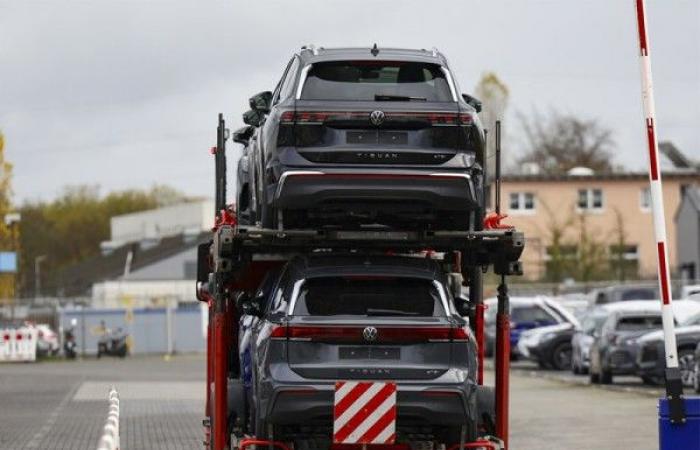The 27.4% drop in electric vehicle registrations weighs on the entire German global market, which fell by 1.0% after two consecutive years of growth.
Registrations of electric cars in Germany fell sharply in 2024, weighing down the entire automobile market which has started to decline again, with no real prospect of recovery in Europe’s largest economy which is in the midst of depression.
This grim assessment for the German automobile market, a pillar of the national industry, was expected after a succession of bad indicators over the months.
Over the whole of 2024, 381,000 electric vehicles were registered, an annual fall of 27.4% after five years of robust growth, the federal automobile agency KBA said on Monday.
The cause: demand slowed by the lasting effects of inflation as well as the sudden end, a year ago, of public aid for the purchase of battery-powered cars. The electric market share fell to 13.5% of total vehicle sales, after approaching 19% in 2023.
In total, 2.81 million cars were registered last year in Europe’s largest economy, a decline of 1.0% after two consecutive years of increase.
With 992,000 new units, gasoline engines are even regaining ground against electric vehicles despite European objectives, with registrations up 1.4%.
The only positive point: the hybrid vehicle segment is regaining momentum, with an annual increase of 12.7%, and now represents one in three registrations.
The trend of electric decline is European: sales of electric cars fell in 14 of the 27 EU countries in November, their market share falling from 16.3% to 15%, according to the EY firm.
Geopolitical threats
Wave of social plans, eroded margins, increased Chinese competition: the year 2024 has been strewn with alarming news for German manufacturers. The first of them, Volkswagen, announced the elimination of 35,000 jobs by 2030, an unprecedented cut intended to reduce its costs.
“There is a fear that 2025 will not really be better,” said Constantin Gall, analyst at EY.
For next year, the automobile importers’ federation VDIK expects around 2.85 million new registrations in Germany, a very slight increase.
Since the beginning of January, manufacturers have had to deal with more severe European sanctions on the pollution thresholds of thermal vehicles.
A large part of the German political class wants to revise or even postpone the sanctions, which could weigh 16 billion euros in investment capacity on manufacturers, according to the Association of European Automobile Manufacturers (ACEA).
At an EU summit in December, Chancellor Olaf Scholz called on the European Commission to find a way so that fines “do not affect the financial capacity of companies that now have to invest in electromobility.”
An additional burden in the midst of global geopolitical threats, between the customs duties promised by Donald Trump and potential retaliatory measures from Beijing after the adoption of surcharges on Chinese electric cars by the European Commission.
The leader of the German conservative CDU, Friedrich Merz, favorite in the legislative elections on February 23, is openly fighting against the ban on the sale of new thermal engines in the EU set for 2035.
The country of the automobile is moving further and further away from the very ambitious objective of 15 million electric cars on the road by 2030.
The sudden end of government subsidies for electric vehicles in December 2023 “caused massive uncertainty among potential buyers, which still persists today,” continues Mr. Gall.
Shy tax cuts came in August for electric company cars in Germany, but consumers remain cautious about models that are on average more expensive than their thermal counterparts.
For Constantin Gall, “the risk is great that many interested people will postpone their purchase today, in the hope of being able to benefit from possible public aid”.
The electric segment should certainly recover in 2025, with manufacturers forced to accelerate their electric shift and lower their prices according to EY.
But “this growth [des ventes] will probably be dearly paid”, because “the price reductions will be to the detriment of the profitability of manufacturers”, adds Constantin Gall.
To attract consumers, Social Democratic Chancellor Olaf Scholz, candidate for re-election, is calling for a European bonus for the purchase of electric cars.






